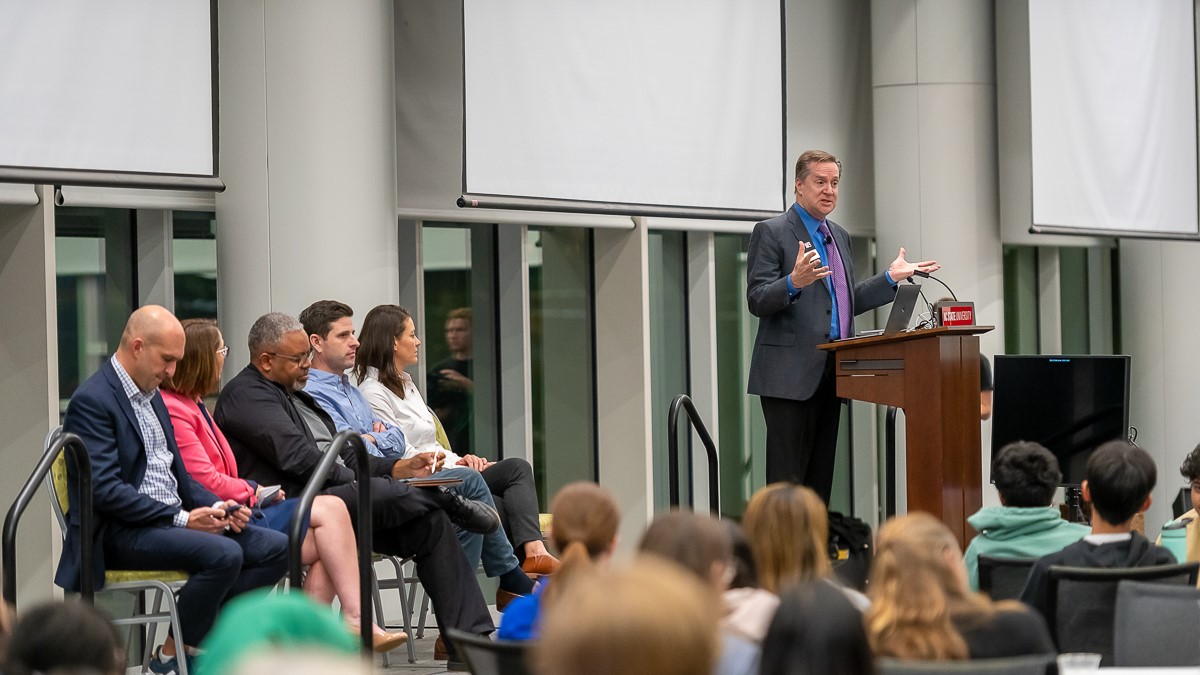A major gift to NC State’s Office of Research Commercialization will enable even more Wolfpack innovators to conduct commercially focused research in the coming years.
Entrepreneur and investor Bill Spruill recently donated $900,000 toward the Chancellor’s Innovation Fund (CIF), which awards annual grants to Pack members in order to further their cutting-edge work. Spruill hopes his gift will not only help these projects come to fruition faster and more easily that might otherwise be possible but will also inspire others to join him in supporting this important fund.
Important for NC State, and important for the surrounding area.
“Of course, the primary point of this gift is to stimulate the commercialization of real science-based technology opportunities out of the university environment,” Spruill said. “But the secondary purpose is to get the rest of the NC State community, as well as the Triangle investing community, to rally around bigger investments in this type of area and this type of work.”
To that end, Spruill’s gift created the 2ndF Research Commercialization Fund. The name is derived from 2ndF, a family office that Spruill started in 2022 following the sale of a company he cofounded with fellow NC State supporter Charles Gaddy. 2ndF’s mission: to grow the Triangle ecosystem through focused execution on education, investment and global collaboration.
Distributions from the 2ndF Research Commercialization Fund will be used to support programmatic efforts and awards related to CIF.
CIF was established in 2010 and provides grants of up to $50,000 to university researchers working on short-term, commercially viable projects. Students and faculty who have disclosed their inventions to the Office of Research Commercialization can apply for CIF grants in order to bridge the gap between the public and private funding they need to succeed. Proposals are submitted explaining how the technology the researchers are developing will fill a real-world need, followed by an in-person pitch for finalists to explain their research to the CIF selection committee in greater detail.
Since its inception in 2010, CIF has awarded $4.3 million to 69 teams, resulting in the execution of 63 commercialization agreements, the launch of 34 startup companies and the attraction of more than $78 million in follow-on capital by funded teams.
In 2022, for instance, CIF awarded grants to projects involving research into better COVID-19 antibody tests, enhanced Bluetooth EKGs, nanogels that could one day be used to kickstart the body’s production of healing cells and more. The 2023 award winners, who will be the first to benefit from the 2ndF Research Commercialization Fund, are scheduled to be notified the week of May 29.
“The 2ndF Research Commercialization Fund will likely provide the first funding and support for university spinouts — helping transformative research cross the ‘valley of death’ and enter the real world,” Kyle Tomek, cofounder of DNAli (a CIF finalist), said. “This donation will exponentially increase the force of the impact of NC State’s CIF, extending its reach and impact on early-stage innovations. Bill is setting the tone for the NC State and Research Triangle Park entrepreneurial ecosystem and helping make our region more competitive with traditional tech and biotech hubs like Boston and the Bay Area.”
“Bill Spruill’s generous gift recognizes CIF’s success and is aimed at amplifying these efforts to increase the program impact and more quickly transition university research into the market,” Wade Fulghum, assistant vice chancellor for research commercialization, said. “His vision matches ours.
“We hope to be good stewards of the funding dedicated to this vision,” Fulghum added, “and are very grateful for this fuel to amplify NC State’s commitment to deep technology commercialization. Bill stepped up in a big way, and it will result in a major impact for the Triangle.”
With the additional support for CIF that the 2ndF Research Commercialization Fund is providing, Spruill hopes to see even more groundbreaking and life-changing research ideas come to market soon as commercially viable products.
He also hopes they lead to the launch of even more companies that can help Raleigh and surrounding cities realize their innovative potential — especially ones that play to NC State strengths such as chip manufacturing, textile design and battery technology.
“Building these types of platforms, these types of companies, over the long hall will actually yield more Red Hats, more SASs, more Quintiles, more PPDs for the Triangle,” Spruill said. “If we make those investments now — it won’t be an overnight thing, but over the next 10, 15, 20 years, that will help us remain strong and competitive with communities such as Seattle, Austin and Boston.
“Let’s work together to grow bigger businesses headquartered here for the betterment of the community,” Spruill added. “Specifically, so they can employ our kids, grandkids, nieces, nephews, cousins and so forth and help the Triangle become a greater community. We need more of that.”
For more information on CIF and how you can apply for funding or contribute to its ongoing success, visit research.ncsu.edu.
- Categories:



